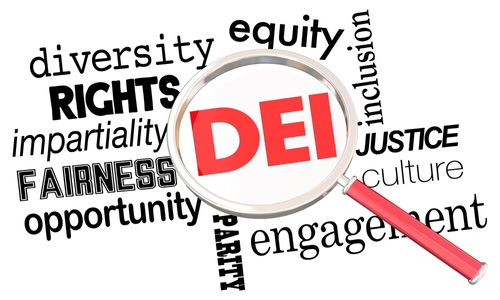In recent years, companies of all sizes have made strides in the areas of diversity, equity, and inclusion (DEI); however, as a recession looms, many worry these gains may be lost as financial challenges supplant corporate focus on social issues. Companies must maintain their commitments to DEI, which will define corporate culture and productivity both through the recession and long after the economy rebounds.
Benefits of Diversity
The benefits of having diverse decision-makers are now well documented. Numerous reports published by observers in a host of industries have, qualitatively and quantitatively, found that embracing diverse perspectives creates a competitive advantage and increases revenue generation and checks and balances. As a result, many companies have moved past considering DEI to be an aspirational social responsibility and are using diversity to improve their business operations and profitability. Nevertheless, a recession can force corporate leadership to make hard choices. Employees and stakeholders will all be watching to see whether DEI is considered a tenet of corporate culture or an expendable aspiration. Companies that remain committed will benefit from both the short-term benefits of resilience and the long-term advantage of a diverse workforce.
A recession creates tremendous strain on operations and corporate culture. Whether DEI is genuinely part of your corporate culture will be readily apparent. Employees will notice backsliding, particularly where employees have been attracted to a company’s socially conscious values. A perceived change in the company’s commitments could have a detrimental impact on morale during an already challenging time. In addition, leadership must keep an eye on the DEI commitments they have made to interest holders and the public. Like employees, clients and customers will notice which companies have genuinely embraced DEI and will prioritize DEI through a recession. Furthermore, where companies have publicly touted the benefits of DEI or made specific commitments to diversity goals, there is potential legal exposure to interest holders if DEI programs are substantially reduced or abandoned to the company’s detriment. However, there are steps companies can take to continue the progress of their DEI initiatives without consuming significant resources in the short term.
First and foremost are communication and transparency. Including DEI as part of the company’s recession mitigation planning appropriately elevates DEI into the discussion of other vital business operations. DEI recession planning can include an evaluation of current programing and associated costs, as well as stakeholder assessment of the most valuable initiatives. Significantly, this provides a foundation for discussion if programs must be reprioritized.
Second, companies should be willing to rethink the “equity” of how they approach events such as layoffs. While many companies may have used seniority as the predominant consideration in past layoffs to retain senior employees, a company that has recently increased the diversity of its employees should examine the impact and optics of reducing only the more junior—and potentially more diverse—employees. Layoffs based on productivity and salary considerations, rather than merely seniority, may be more equitable and better for the company in the long run.
Third, companies should look for ways to leverage existing benefits and programs to ensure ongoing equity and inclusion. For example, many employers have created employee resource groups (ERGs) as safe, open meetings wherein employees can be candid and raise personal and professional challenges. Companies can create or re-center existing ERGs as a place for employees to be heard and their concerns addressed, particularly when a recession has created new anxiety and uncertainty.
The Bottom Line
A recession exposes the weaknesses in every company. Companies should be prepared to address DEI as a core operational value that must be maintained—even through a recession. Companies that can find ways to continue to communicate with stakeholders and advance their DEI goals despite other financial challenges will reap the long- and short-term benefits of a more productive and creative workforce.
Stephanie Resnick and John Fuller are co-chairs of the Directors’ & Officers’ Liability & Corporate Governance Practice Group at Fox Rothschild LLP. They can be reached at sresnick@foxrothschild.com and jfuller@foxrothschild.com, respectively.

